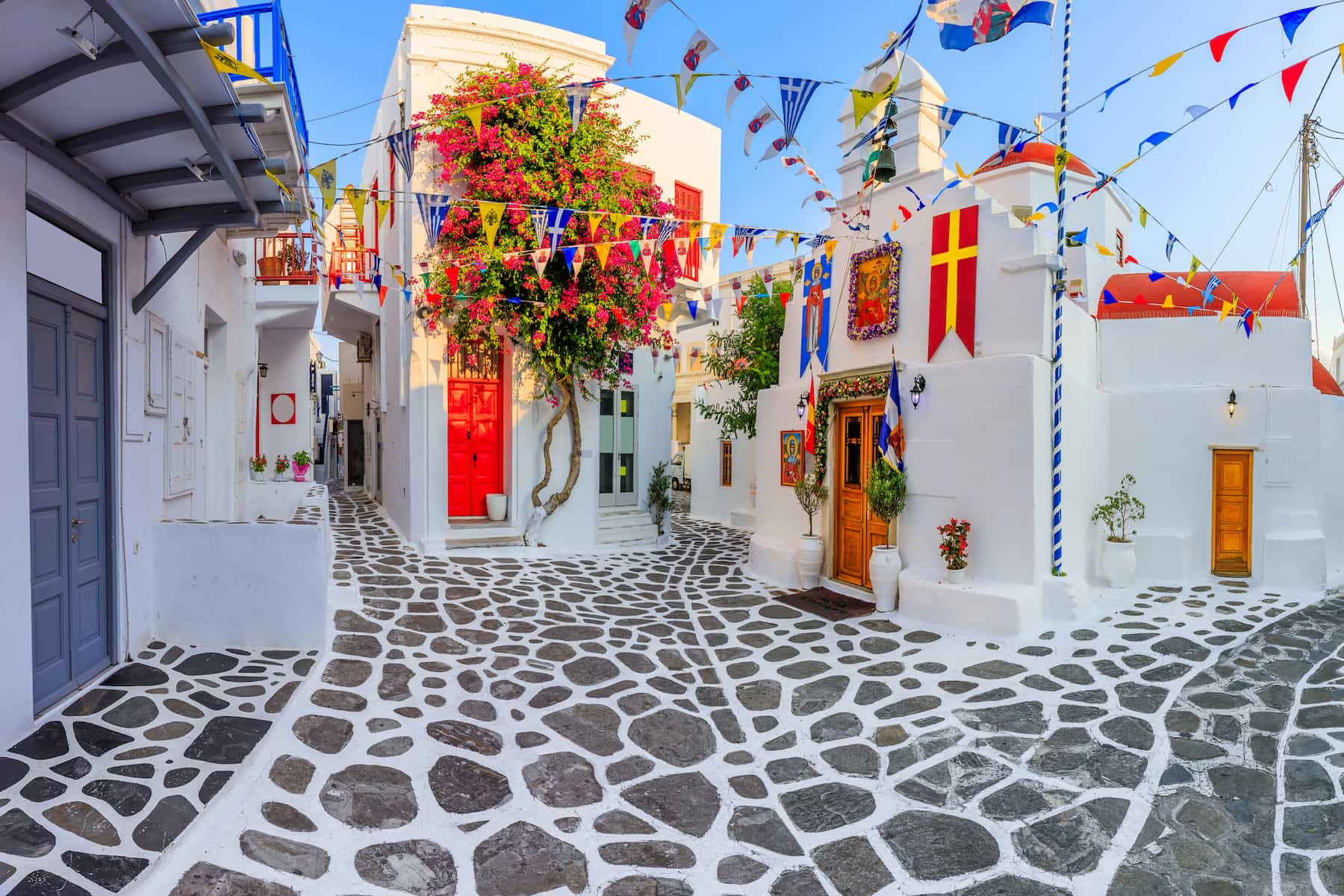Greece Travel Guide
Intro to Greece
Editor’s Note: In Go World Travel Magazine, we share places, products and activities we recommend. If you make a purchase using a link on our site, we may earn a commission.
Kalimera!
This is how you’ll be greeted in the morning when you travel to Greece. Welcome to the south of Europe, welcome to the land of democracy and philosophy, and the Olympic Games.
Have you ever tried feta cheese or tzatziki salad? You’ve probably heard of Greek yogurt? These are Greek specialties, along with souvlaki and gyros. Greece is also a large producer of top-quality olive oil.
The Greeks are welcoming, fun people, and adore the traditional Sirtaki dance. Of course, they are cheerful as they have as many as 250 sunny days a year. Greece is the southernmost member of the European Union. It is surrounded by the Aegean, Mediterranean and Ionian seas. Greece offers beautiful beaches and picturesque villages with narrow streets and tavernas.
The Peloponnese peninsula is known for its poleis, former city-states like ancient Sparta. Numerous archeological sites testify to the rich history of Greece. The ancient Acropolis, with the Parthenon temple, is a landmark of Athens. Other important archaeological sites include Delphi, in the south of mainland Greece, with the temple of the god Apollo.
Meteora monasteries will leave you breathless because of the grandiose cliffs on which they are located and the magnificent view of the valley. The old town on the island of Rhodes near Turkey is one of the best-preserved fortifications in the Mediterranean. The Cyclades are among the most famous Greek islands. Santorini is a favorite place for honeymooners, and Mykonos is known for having a great nightlife.
You will also love the beautiful Golden Beach on the island of Paros, the surfing paradise of Naxos, the well-maintained bike paths on the island of Kos, as well as the incredible cultural and historical heritage and natural beauty of Crete.
Corfu and Lefkada are beautiful islands in the western part of Greece. Thessaloniki is a large city in central Greece with numerous Byzantine monuments and for centuries the most important port on the Aegean Sea, which is often used by large cruise ships.
The coronavirus pandemic and lockdowns have also affected trips to Greece, so find out about the conditions for entering this country before leaving home. You will probably need a vaccination certificate or a negative PCR test.
Find more tours and activities to make the most of your stay in Greece through GetYourGuide. Whether you want to Volcanic Islands Cruise with Hot Springs Visit in Santorini or go on a Sunset Historic Tour of Cape Sounion in Athens, there is something that everyone will find fun and interesting. See more locations in Greece and book your dates here.
Plan Your Trip
Where is Greece?
Greece is located in Southeastern Europe, bordered in the north by Albania, Macedonia, Bulgaria and Istanbul. The country is surrounded by the Aegean Sea and the Ionian Sea with many Greek island chains throughout those waters.
Getting Around Greece
Athens’ Eleftherios Venizelos International Airport (known as AIA) is well connected, so you can fly in from all the major world cities. During the summer season, there are also flights from many European cities to Thessaloniki, Santorini, Rhodes, Corfu and the city of Heraklion in Crete .
However, you will best tour many cities in Greece by car. Also, you can travel by bus between major cities, and even to popular destinations such as Kefalonia and Zakynthos, using the ferry as an additional mode of transport. The Greek islands are well connected by ferries, so during the summer season, ships and small boats travel between the islands several times a day, as well as to places on the mainland of Greece.
Language
About 11 million people in Greece speak Greek. There are also various dialects like Cretan or Pontic. You can also hear Albanian, Macedonian, Bulgarian and Turkish in the border areas. Of the foreign languages, Greeks speak mostly English, while some also understand Italian, German and French.
Currency
The former Greek currency, the drachma, was replaced by the euro in 2002. You can also use major credit cards. But, be aware that in rural areas or on less-popular islands, cash only is required for payment. So, exchange enough money at the airport or hotel so you don’t have payment problems. You can also obtain money from ATMs in almost every town.
When is the Best Time to Visit Greece?
If you are visiting Greece for swimming in the sea and enjoying the sandy beaches, then the best period to visit is from June to the end of September. During that time of year, you can enjoy about 14 hours of daylight and temperatures of over 30 C (86 F).
If you are coming to Greece to explore its archaeological sites and learn about its rich history, April and May are ideal months to visit, as well as October when the summer season is coming to an end. It is less crowded then and temperatures are not as hot, so it is more pleasant to visit the sites. In the spring, you can enjoy the flowers that decorate many charming villages, so you will have the opportunity to take excellent photos for your Instagram.
From October to March, temperatures range from 10 to 15 degrees C (50 to 60 F) and rain is more frequent. There is also snow on the mountain tops during the winter.
What to Pack When Visiting Greece?
You don’t need a lot of clothes to visit Greece during the summer season. For a Mediterranean climate, bring T-shirts and shorts or summer dresses during the day. A shirt or a thin jacket will be enough for evening outings. Make sure to pack large towels, sunglasses, a hat and sunscreen. Wear light shoes or sandals for walking and bring a pair of slippers.
Be practical, so bring a medium-sized backpack in which you can put a bottle of water, a beach towel and a spare T-shirt if you plan to spend the day exploring the beaches.
To visit Greece during late autumn and winter, you will need a sweater, jeans or pants, as well as water-resistant shoes and a jacket. If you are planning a visit to Olympus and other mountains, bring standard hiking clothes and footwear.
Top Destinations in Greece
Latest Stories on Greece Travel
The World’s Most Breathtaking Sunsets: A Journey Across 4 Continents
The Ultimate European Bucket List: 23 Life-Changing Experiences
The Mythical Island of Crete: History, Beaches, and Adventure
Tinos: The Greek Island Where Hiking Trails Are Windows to the Past
Greece’s Meteora Monasteries
Travel Guide to Greece
Go Off the Beaten Path to the Magical Island of Chios, Greece
Best Ways to Enjoy A Short Trip to Athens, Greece
Affordable, Luxury, or Family-Friendly: 10 Best Hotels in Santorini, Greece















